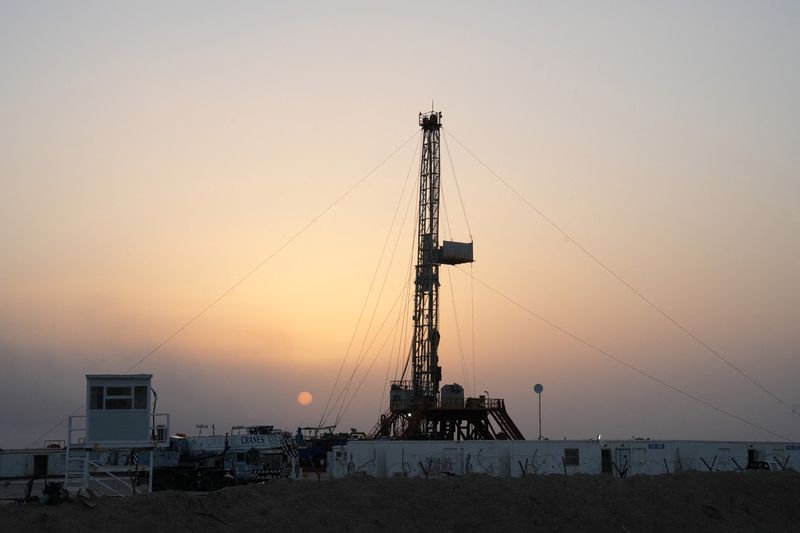By Alex Lawler, Nerijus Adomaitis and Swati Verma
LONDON (Reuters) -Producer group OPEC and the International Energy Agency, the world's most closely watched forecasters of oil demand growth, are further apart than they have been for at least 16 years in their views on fuel use, according to Reuters research.
The gap between the IEA, which represents industrialised countries, and the Organization of the Petroleum Exporting Countries means the two are sending divergent signals to traders and investors on oil market strength in 2024 and, for the longer term, about the speed of the world's transition to cleaner fuels.
In February this year, the IEA predicted demand will rise by 1.22 million barrels per day (bpd) in 2024, while in its February report OPEC expected 2.25 million bpd. The difference is about 1% of world demand.
"The IEA has a very strong perception that the energy transition will move ahead at a much faster pace," Neil Atkinson, a former head of the IEA's Oil Markets Division, said.
"Both agencies have boxed themselves in with a position, which is why they have this enormous gulf in demand forecasts."
To set the difference in context, Reuters analysed the changes each agency has made to its oil demand forecasts from 2008 to 2023, and the first two months of this year.
The period was chosen to give a long enough time series to draw conclusions and because it included extreme volatility in oil demand, starting with the 2008 financial crisis and ending with the 2020 pandemic and subsequent demand recovery.
International oil futures hit an all-time high of almost $150 a barrel in July 2008, compared with roughly $80 now.
Reuters' analysis of 16 years of IEA and OPEC monthly reports found the 1.03 million bpd gap in February was the biggest in per-barrel terms in that period.
The IEA, asked about the gap between the two agencies' 2024 forecasts and whether it saw its forecasts as more accurate than OPEC's, said this year's demand slowdown amounted to a return to the growth trends seen before the pandemic, and the slowdown is already visible in oil deliveries data.
"We expect this to continue this year, with mobility indicators suggesting that road and air traffic are stabilising," the IEA said, adding it could not comment on other organisations' forecasts.
OPEC, also asked to comment on the gap and whether it saw its forecasts as more accurate, said its 2023 demand growth forecast of 2.5 million bpd was only slightly below its initial number given in July 2022.
"We have been very steady with our 2023 oil demand forecast. Many other forecasters started low and then continually revised up their 2023 forecast," OPEC's Vienna secretariat said, without commenting on 2024.
IEA GREEN SHIFT
OPEC and the IEA also disagree over the medium term. The IEA expects oil demand to peak by 2030 as the world switches to cleaner fuels. OPEC dismisses that view.
OPEC on Monday reiterated its forecast out to 2045 does not see a peak, citing expected growth outside industrialised Organisation for Economic Co-operation and Development nations and "pushback on some initial net-zero policies".
The IEA, formed 50 years ago as the industrialised world's energy watchdog has shifted its focus on oil and gas supply security to championing renewables and climate action. For some OPEC members, this undermines its role as an impartial authority.
"They have moved from being a forecaster and assessor of the market to one practising political advocacy," Saudi Arabia's Energy Minister Prince Abdulaziz bin Salman said last September.
IEA members are mostly big energy consumers and the governments of many of them have decided to accelerate the development of renewable energy to accelerate the shift toward a low-carbon economy.
They are looking to their energy watchdog to show them how to get there, analysts say. OPEC members by contrast, which depend on fossil fuel revenue, face potentially catastrophic economic consequences from a rapid transition away from oil.
The analysis found the two bodies' forecasts have tied statistically in terms of forecast accuracy, making it hard to say which will be right based on the track record.
Please click on TABLE to see the IEA and OPEC forecasts Reuters used.
Reuters also gathered estimates from 26 analysts at banks and research firms of 2024 demand growth. The mean of these estimates is 1.3 million bpd, or closer to the IEA view.
Of 20 analyst responses on the question of whether demand will peak by 2030, 12 analysts said no, suggesting OPEC is seen as more likely to be right on this point.
UPWARD REVISIONS
Like all economic forecasts, oil demand predictions are subject to revision and impacted by many events that are impossible to foresee.
Data on physical oil use takes time to emerge, adding to the challenge.
According to the IEA, demand growth will halve in 2024 partly as a result of a booming electric vehicle fleet, although as of January the agency had revised upwards the 2024 demand growth forecast for three straight months.
Amrita Sen, founder of Energy Aspects, said that the IEA tended to revise its demand upwards, as did Atkinson.
"I'd say the IEA's oil demand forecasts keep getting revised higher," Sen said. "Peak oil demand will likely be higher than the IEA forecasts."
The Reuters analysis found that over 2008-2023 the IEA under-estimated total demand in its initial forecast 56% of the time compared to 50% of the time by OPEC - not a large difference.
Atkinson said that although both agencies have forecast demand developments accurately, like Sen of Energy Aspects he thought OPEC was more likely to be right on the issue of demand peaking this decade.
"At various times in history, the IEA and OPEC have both called it quite well," he said. "I think the IEA are premature in calling for a demand peak by 2030 due to growth in developing countries."
